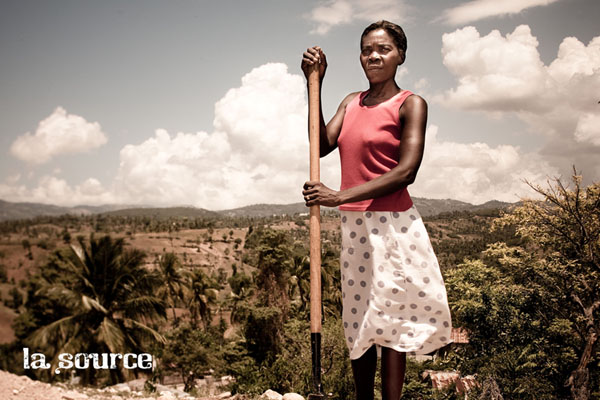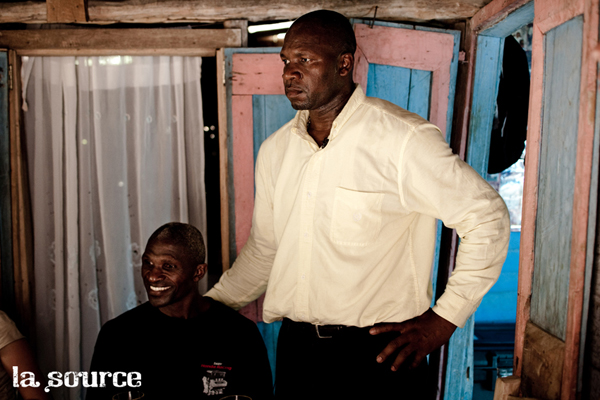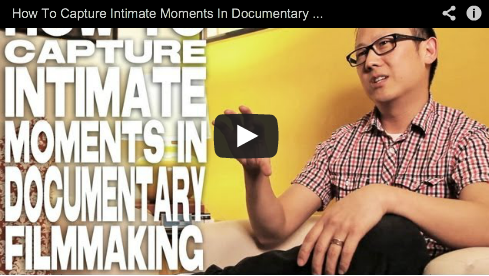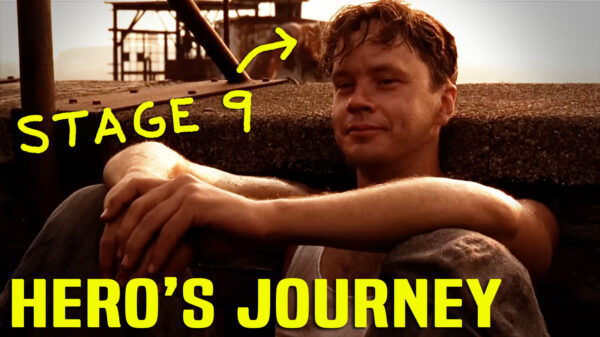
PATRICK SHEN – FILMMAKER/FOUNDER OF TRANSCENDENTAL MEDIA
It’s an interesting time in the world. People are craving authenticity in their lives more than ever before. The same generation once described as the “disposable population” is now occupying Wall Street protesting corporate greed and economic inequality. It’s not just young people that are getting involved in issues they care about. Everyone is looking for something to get behind, something to stand for, something to identify with.

I’m currently in the midst of completing post-production on my third feature length documentary La Source and our team is in the throes of finalizing the strategy (and raising funds) to get this film out into the world. La Source is a character-driven narrative documentary surrounding a particular community’s water crisis. While La Source is not your typical David vs. Goliath “social issue” film, it will undoubtedly and compellingly (we hope), shed light upon the global water crisis, the leading cause of death in the world. Clearly, a traditional marketing campaign wouldn’t do the film justice. In developing our action campaign plan, we’ve had to really dive into understanding what social action campaigns are, why they’re important, and how they can be used to promote a film and its message. I thought I’d share some of our thoughts and findings in this article. For further reading, I also suggest reading some recent case studies (links below) that go into detail about what’s possible with social action campaigns.

Love ’em or hate ’em, the popularity of social issue films is showing no signs of slowing down. Personally, I’m not a huge of fan of the genre itself. Don’t get me wrong, I care about making the world better. I started a film company with the vision to “agitate the sleep of mankind” after all, but story will always be king, and no one gets a free pass when it comes to that. Tell me a great story and I’ll be more inclined to get behind your cause. Otherwise, it’s just a bunch of information. We get enough of that already in our super-connected world. Commissioning organizations and filmmakers who understand this, as an inventory of the social issue films of the past will reveal, stand a much better chance to be seen and heard.
What is a social action campaign? They take on many different forms depending on the nature of the film and sometimes they even go by different names – you might have heard them referred to as awareness campaigns, audience engagement, advocacy campaigns, or outreach campaigns. Essentially, it’s an effort to engage people on a particular issue to accomplish one or all of the following: build public awareness, ignite personal involvement and inspire social change. Some social action campaigns are nothing more than thinly veiled attempts at getting people to buy more DVDs while others have taken the time to develop strategic partnerships with non-profits and policy-makers, offering real solutions to the problem their films address, and even provide people with immediate and effective ways to get involved in the cause.

Why have we chosen to launch a social action campaign? For starters, as we’re all well aware, it’s a whole new world for independents and anything having to do with tradition has all been practically thrown out the window. We talk now of the good ‘ol days when filmmakers took their films to Sundance and got swept off their feet by a major studio like they’re tales from another world. Nowadays, more than ever before, our wrap parties are tinged with a hint of anxiety about how in the world we’re going to get people to see our film and how we’re going to make our money back. In order to thrive, we’ve got to get our hands dirty at least until we find a partner like Participant Media’s TakePart who has the manpower and experience to do the work for us and do it effectively. Secondly, if you’re reading this article, you obviously care just as much about spreading the message of your film as you do about making it profitable. An effectively executed social action campaign can accomplish all of the above. While this might mean putting the camera down for awhile longer before we dive into the next project, stories about filmmakers, like the ones behind Food Matters, getting their message heard by millions and raking in loads of money for their films via innovative self-distribution methods and outreach campaigns, is encouraging.

What does a social action campaign look like? Again, they can look very different from project to project and what you do with yours will ultimately depend on your creativity and your budget. For starters, a user-friendly and fully web 2.0 optimized website that can creatively engage audiences, serve as a base of operations, and be a trusted source for all developments pertaining to the film and the campaign is pretty key. Months before Waiting for Superman premiered in September 2010, visitors to the website could make a pledge to see the film by a few simple clicks of the mouse. As an added incentive to get people involved, the filmmakers lined up sponsors that agreed to make contributions to schools or libraries once their “Pledge Progress Meter” reached certain milestones. For example, at 30,000 pledges DonorsChoose.org gave $5 philanthropic gift codes to those who made the pledge to see the film that could be donated towards classroom projects of their choosing on DonorsChoose.org. As an added bonus for the filmmakers, they were able to collect visitors’ information (name, email, and zip code) to gauge interest amongst cities in the U.S. to support their release strategy down the road. By May of 2011, approximately 294,000 people had pledged to see the film, it had grossed $6.4 million in the U.S., and it was praised as being “the most high-profile thing to happen to education in a very long time”.

Partnerships with key non-profits, corporations, and/or individuals who share a similar goal and audience as your film is another key strategy that all successful campaigns have in common. There are over 1.5 million non-profits in the world representing every cause imaginable and the chances are pretty good that there is a good match for your film out there. Non-profits are beginning to understand the importance of media and the power of storytelling. They need us for our ability to tell stories and inspire their people and we need them for their people, who are already fired up about our cause. It’s a win-win for both sides. I’d also suggest attending events like the Good Pitch, which exist solely to partner NGOs and philanthropists with filmmakers. When you find a potential match, keep in touch with them and develop that relationship. We met Generosity Water, an LA-based NPO which funds wells for communities in developing nations, at the Silverdocs Documentary Festival back in 2009. Now we’re partnered with them to develop and implement a nationwide action campaign in 2012 for La Source.
Corporations, who by the way are also looking for new ways to reach audiences, can often be very powerful partners too. The hugely successful King Corn, a documentary about the industrialization of corn production, raised $500,000 for their outreach campaign due in large part to their partnership with the Kellogg Foundation. And don’t forget about celebrities. Just like the rest of us, celebrities too are looking for more authenticity in their lives and to make the world better. Some talent agencies like CAA even have charitable departments set up specifically to partner their clients with a cause. If you haven’t seen the “My Friend Is…” PSA for The Cove, take two minutes to do that now. It’s a great example of how social media and celebrity endorsement can be combined to rally people behind your cause. Lastly, in regards to partnerships, the ultimate goal for us filmmakers is to make more films. Partner with a group, hire an outreach coordinator, or recruit a team of volunteers so you can get back to dreaming up your next film as quickly as possible. You need to be there at the beginning to cast vision and get the ball rolling, but try not to get stuck doing all the work if possible.
Another very important aspect of great action campaigns is the action plan. You’ve made a great film and people are pumped. Don’t let them leave that theater without clear, immediate, and effective options to get involved. Let them know how they can help spread the message of the film by telling their friends or organizing their own screenings and fundraisers. Give them instructions and tools so that they can do so easily, and ideally, have some fun doing it. Your film screenings shouldn’t just be about showing your film. They should be events. They should be experiences for your audience. Robert Greenwald and his team at Brave New Films provide some pretty good tips on their Rethink Afghanistan website in regards to organizing screenings for more politically-leaning films and getting a good turnout. Also, check out this previous article of mine where you can download more tips and discussion guides we created for my last film, The Philosopher Kings. Be clear about the agenda behind your campaign. Are you looking to raise money for a cause or are you pushing for legislation to be passed? Where can they donate money? To whom do they write letters? People need clear instructions or you’ll lose them the second they walk out of the theater. This is where partnerships are key. There might already be an elected official or non-profit championing your cause who has launched their own action campaign of sorts. If so, link up with them and get your audience involved with the work already being done.

There’s a lot more to discuss but I’ll leave with you just a couple more thoughts on action campaigns. Again, I suggest reading the case studies like those done by the Center for Social Media and doing an exhaustive study of what other films have done in the past. You’ll find in your research that the beauty of social action campaigns is in the ripple effect that takes place as a result. The extensive report by the Channel 4 Britdoc Foundation measuring the social, corporate, and political impact of The End of the Line in the U.K. calculated that for every one person who saw the film another 510 people had heard about it. That translated to about 4.7 million people in the UK alone that became aware of the film and its message. The exponential effect that the film and its campaign had on the public’s awareness of the implications of over-fishing in our oceans was valued by PR experts to be worth over $6.5 million. That’s not bad for a film with a total budget of $1.5 million.
And lastly, don’t forget (not likely) that you need to make money. Don’t be a martyr for the cause unless you don’t plan on making any more films or at least great films. Poor filmmakers are too busy surviving to make the films they’re truly capable of. I’ll assume you’ll be pursuing distribution for your film and all that. There’s still money to be made via some of the old world methods and that obviously needs to be part of your strategy to make money. The more buzz you generate for your film via your action campaign and your festival wins, the more you can jack up your film’s asking price with distributors. More importantly, the more traffic you get at screenings and on your website, the more merchandise (i.e. DVDs) you can sell directly to your fans. Get creative with your merchandise. Sell “screening packages” that include DVDs, posters, and postcards for those interested in organizing a screening. If you’re feeling entrepreneurial, create a whole line of products with your film’s branding on it. Check out the Helvetica online store for a good example of basic merchandise options (DVD, poster, etc) and some extras too (limited edition posters, etc). If you’re not equipped to sell product on your own, hire an order fulfillment service to do it for you. Bottom line: the sooner we stop relying on “Hollywood” to hand us a career, the sooner we’ll be making more movies.
BIO:
Patrick Shen is a multiple award-winning director and founder of Transcendental Media. Before directing and producing feature films Patrick produced over a dozen short films for non-profit organizations, worked on various Emmy-award winning TV shows at E! Networks and ESPN, and served as 2nd Unit Director on the Emmy-nominated PBS documentary “We Served With Pride” which earned him an invite to the White House to meet with President Clinton. Patrick served as director, producer, and editor on TM releases “Flight from Death,” “The Philosopher Kings,” and the soon to be released “La Source,” a feature documentary about two brothers and their dream to bring clean water to their village in Haiti. For more information, check out www.transcendentalmedia.com. To get involved in the La Source Social Action Campaign, visit here.

Watch the video on Youtube here
Check out more great content on Film Courage
from Patrick Shen:
Patrick’s Film Courage article MAKING YOUR FILM MATTER: AN INTRODUCTION TO SOCIAL ACTION CAMPAIGNS
Patrick Shen and Brandon Vedder on their LA SOURCE MOVIE – Film Courage Podcast Episode #138
Outside-The-Film Courage-Studio (video) interview with Patrick Shen and Brandon Vedder
Advertisement

Batman fans! Watch the campaign video here on GoFundMe and check out the story behind the music from the 1966 “Batman” Television Series
THE BEAT OF THE BAT is a full-length documentary that tells the story of the music of the 1966 “Batman” Television Series and how composers Neal Hefti, Nelson Riddle & Billy May gave Batman his first real musical identity- and one that has remained inexorably tied to the character for over 50 years!
In fact, if you saw the just released “Lego Batman Movie” you might have noticed the numerous references to the music of the TV series.
And face it, you can go up to anyone, anywhere in the world and sing “Na Na Na Na Na Na Na Na!” and they will instantly know what you are talking about!
The music was as important to the show as the bright colors, campy dialogue and tongue-in-cheek performances. Yet, strangely, the story of how it came to be has never been told… Until now.

Watch EXODUS on iTunes starting April 18th, 2017
EXODUS documents the journey of Syrian refugees as they cross the Aegean Sea from Turkey into Greece. In the winter of 2015, over three thousand refugees attempted this treacherous crossing everyday, all in hope of seeking asylum in the European Union. It’s a life and death gamble that they are willing to take, all for a chance at a new life away from their war-torn homeland.

Watch FREAK OUT on iTunes here!
FREAK OUT: Matan, a soldier in the IDF, sets off for a week of patrolling in a remote base in the north of Israel with three soldiers whom he doesn’t know. As the week progresses, the soldiers begin to question whether they will come out of this experience alive.

Watch THE HOLLY KANE EXPERIMENT on iTunes here!
THE HOLLY KANE EXPERIMENT: An obsessive psychologist attempts to reprogram her subconscious mind, but when her actions become increasingly uncharacteristic she fears her experiment is dangerously out of control.

Watch the video here about filmmaker Roee Messinger and his desire to create this powerful documentary film
AMERICAN TRIAL seeks to discover what a trial in the Eric Garner case might have taught us. How is our legal system designed to handle cases such as Garner’s? What verdict may have been returned after all the evidence was presented? More importantly, what conversations, perspectives and emotions went unexamined because of the grand jury’s decision?
Similarly to fiction courtroom dramas, the lead characters of this documentary will be the attorneys leading the prosecution and the defense. Our camera will capture them as they develop their public arguments and individual positions. How do they decide which witnesses to summon? How do they prepare for their court appearance? Are there any discrepancies between their systemic role and their true feelings regarding the case?
The film will also follow a news crews covering the trial and reporting on race relations in America within the context of the trial and the movement for black lives. They will travel across America to discover what public figures, intellectuals and activists think about the Eric Garner case, as well as other similar cases through the prism of racial relations in the United States.

























